
views
What is a eulogy?
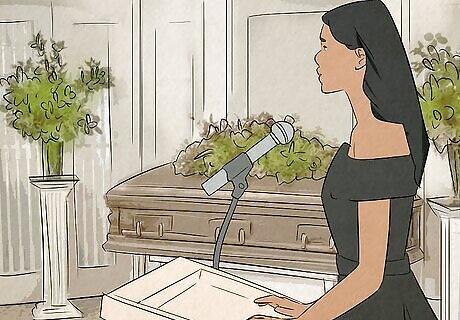
A eulogy is a speech given at a funeral to honor the deceased. Typically, a close relative, friend, or religious leader writes and delivers a eulogy to celebrate the life and achievements of the deceased. Eulogies provide comfort to mourners and allow them to recall fond memories as they say goodbye. A good eulogy reflects the personality, character, and achievements of the deceased while typically incorporating personal anecdotes from the person delivering the speech. Every eulogy is different, but the most important thing is that it is heartfelt and accurately depicts the person being honored.
How to Write a Eulogy

Brainstorm and gather stories before writing. To make writing a eulogy less overwhelming, take the time to make a list of everything you know about the deceased. Jot down information like their age, marital status, and career accomplishments as well as how you personally knew them. Ask the deceased’s loved ones for stories. To make the eulogy personal and heartfelt, ask their friends and family to tell you about them so you can get a full picture of what they were like.

Choose a tone or theme to personalize the eulogy. Try to draw connections between what you know to decide what type of eulogy you want to deliver. How serious or lighthearted do you want it to be? A good eulogy does not need to be uniformly somber, just appropriate. Some eulogy-writers take a serious approach, others are bold enough to add humor. Used cautiously, humor can help convey the personality of the deceased and illustrate some of their endearing qualities. When deciding on a tone, consider the way the deceased passed away. If you're giving a eulogy about a teenager who met an untimely death, your tone should be more serious than if you were giving a eulogy about a grandparent who happily lived to see their ninetieth birthday. Every eulogy is unique, so base the theme around the deceased’s life. For example, if they traveled a lot, talk about all the adventures they had. If they were family-oriented, talk about the cherished memories they shared with their children.
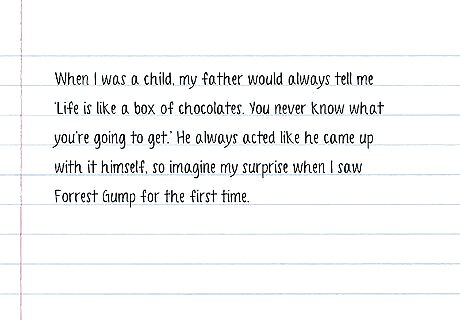
Start the eulogy with a quote or poem. The opening lines should set the tone for the eulogy. Whether you’re choosing a lighthearted route or something more somber, make sure the speech is heartfelt and respectful. Consider opening the eulogy with the deceased’s favorite quote, lyric, religious verse, or a catchphrase they said a lot. Your goal here is to encapsulate their spirit. If the deceased was religious, you can also begin your speech with a prayer. For example, try something like “My mother loved Fleetwood Mac, so I’d like to open with a line from their song “Landslide.” Or, “When I was a child, my father would always tell me ‘Life is like a box of chocolates. You never know what you’re going to get.’ He always acted like he came up with it himself, so imagine my surprise when I saw Forrest Gump for the first time.”
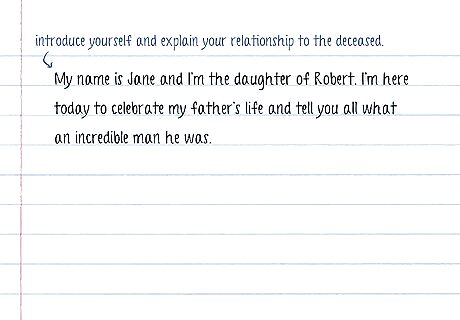
Briefly introduce yourself and explain your relationship to the deceased. Even if most people in the audience know you, it’s still important to introduce yourself. Describe your relationship with the deceased, whether you’re their child, sibling, friend, etc. Tell the audience what the deceased meant to you and what qualities you admire in them. This helps establish the connection for those who might not know you well. If you aren’t related to the deceased, this is also a good time to offer your condolences to the family. You can also describe how you met the deceased if you aren’t a relative. For example, say, “My name is Jane and I’m the daughter of Robert. I’m here today to celebrate my father’s life and tell you all what an incredible man he was.” Or, “For those of you who don’t know me, my name is Ted. I’m proud to say I’ve been Gary’s best friend for forty years.”
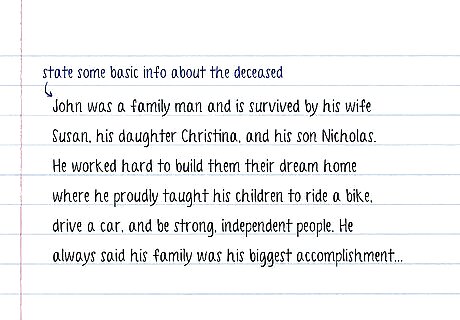
State some basic information about the deceased. Your eulogy doesn’t have to read like an obituary or provide every single detail about the life of the deceased, but try to touch on a few key points, such as their family life, career achievements, and important hobbies and interests they had. Mention this information while praising or remembering the deceased to give the audience an idea of what they were like in life. Write down the names of the family members especially close to the deceased, like a spouse, sibling, child, or parent. You may forget their names on the big day because you're overwhelmed by sadness, so it's advisable to have them on hand. Make sure you say something specific about the family life of the deceased to honor their living family members. For example, say something like “John was a family man and is survived by his wife Susan, his daughter Christina, and his son Nicholas. He worked hard to build them their dream home where he proudly taught his children to ride a bike, drive a car, and be strong, independent people. He always said his family was his biggest accomplishment.” Or, “Lois was a globetrotter. She spent the majority of her life traveling and seeing the world. She’d tell me stories about visiting countries I’d never even heard of and all the adventures she had.”
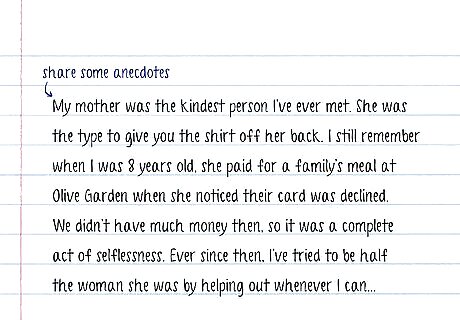
Use specific stories and examples to describe their best qualities. Instead of reciting a list of qualities that the person possesses, mention a quality and then illustrate it with a story. The stories are what bring the person and qualities to life. Think about your own experiences and your conversations with the deceased’s loved ones. Look for a common theme that unites your ideas, and illustrate that theme through specific examples. If the deceased is remembered for being kind, talk about the time they helped a homeless man get back on his feet. If the deceased is known for being a prankster, mention their famous April Fool's prank. For example, you could say “My mother was the kindest person I’ve ever met. She was the type to give you the shirt off her back. I still remember when I was 8 years old, she paid for a family’s meal at Olive Garden when she noticed their card was declined. We didn’t have much money then, so it was a complete act of selflessness. Ever since then, I’ve tried to be half the woman she was by helping out whenever I can.” Pretend that a stranger is listening to your eulogy. Would they get a good sense of the person you're describing without ever meeting them just from your words? The average eulogy is about 3-5 minutes long. That should be enough for you to give a meaningful speech about the deceased. Remember that less is more; you don't want to try the patience of the audience during such a sad occasion.
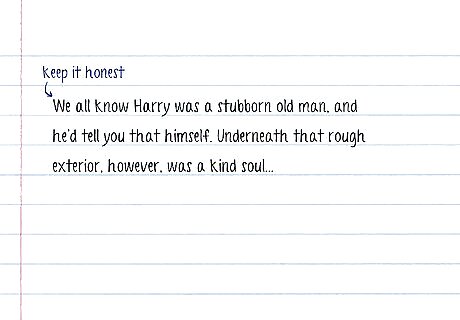
Keep it honest and consider the audience. Remember that no one is perfect, and odds are the deceased had some negative qualities. You don’t have to mention these qualities—and probably shouldn’t—but try not to over-glorify their achievements or pretend they had no shortcomings. If you do decide to talk about their shortcomings, do so in a kind way and consider using some humor to avoid stepping on anyone’s toes. For example, if the person was difficult or inordinately negative, either avoid talking about it or allude to it gently by saying something like “He had his demons, which were a constant battle.” Or, say something like, “We all know Harry was a stubborn old man, and he’d tell you that himself. Underneath that rough exterior, however, was a kind soul.” Avoid making jokes or comments about the deceased that would be a mystery to the majority of the crowd, as well. A good rule of thumb is if you think something could be offensive to the deceased or their loved ones, don’t include it. If you made a joke that might be risky, get feedback from some of the deceased’s loved ones beforehand to determine if it’s appropriate.
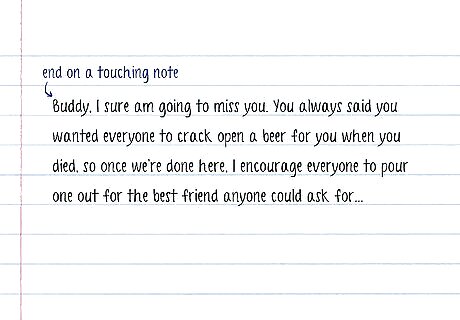
End on a touching note. Think of a few key things you’d like the audience to remember about the deceased and restate them. You may want to conclude with another quote or poem, as well. Express your affection for the deceased, restate your condolences, and say a final goodbye. For example, if the deceased did a lot of charity work, you may encourage the audience to carry out their memory by doing some volunteer work themselves. If the deceased was religious, you can say something like “My mother was a good Christian woman and as she goes to live with God in Heaven, I’d like to leave you with her favorite Bible verse.” You can be heartfelt and still keep things light. If the deceased was the type who didn’t want their funeral to be too sad, try saying something like, “Buddy, I sure am going to miss you. You always said you wanted everyone to crack open a beer for you when you died, so once we’re done here, I encourage everyone to pour one out for the best friend anyone could ask for.”

Get honest feedback. Once you’ve written the eulogy and feel fairly confident in what you’ve included, have some close friends or family members who know the deceased well read it to make sure that it’s accurate and properly captures the essence of the deceased. They’ll also be able to see if you’ve said anything inappropriate, forgotten something important, or written anything that was confusing or difficult to understand. You can also ask someone to help edit your eulogy. Since you’re the only one who will be reading it at the funeral, it doesn’t have to have perfect grammar, but your friends or family members can help you add smoother transitions or remove repetitive phrasing.
How to Give a Eulogy

Rehearse the eulogy before the big day. Read the draft of your eulogy aloud. If you have time and the inclination, read it to someone as practice. Words sound differently when read aloud than on paper. As you read, you may want to add details and reorganize your thoughts. Remember, writing is 90% rewriting, so expect to revise your work several times before it shines. Rehearsing the eulogy will also help you learn to control your emotions and not get choked up over the speech. Try memorizing as much of the speech as you can, or even just reading from notes. Though you should have something to fall back on if you forget what you were going to say, your words will sound more heartfelt if you’re not reading every sentence right off the page.
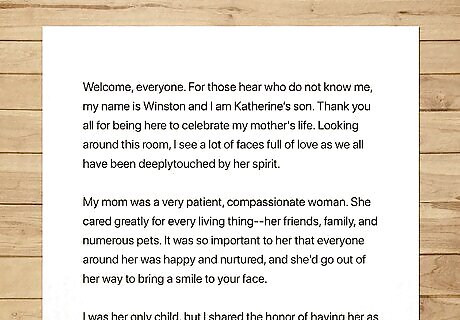
Print your eulogy in an easy-to-read font. Before you take the podium, print the entire speech out so you can refer to it as necessary. Use a large font and double-spacing. If you get teary, you may have a bit of trouble seeing the words, so you don’t want to have to squint to read a tiny font or illegible handwriting, as well.

Keep tissues and a glass of water nearby. You may get choked up while giving your eulogy, and that’s entirely okay and expected. Taking a sip of water can help get rid of the lump in your throat, and use tissues to wipe away any tears that cloud your vision.

Have someone on standby. Though you should hope that you’re emotionally prepared to give the speech on the big day, have a close friend or family member read the eulogy and be prepared to deliver it for you if you’re too choked up to do so. Though you probably won’t need one, you’ll feel more relaxed knowing that you have a backup just in case.

Speak from the heart. Don’t think of a eulogy as public speaking. Before you speak, remember everyone in attendance is there to support you. They won’t judge you for crying, stumbling over your words, or needing someone to finish giving your speech for you. If you get anxious or too emotional, take a few deep breaths to compose yourself and know that everyone appreciates your efforts and admires you for having written and given a eulogy. You can’t fail. Tell yourself you’re not there to win a speech-giving contest or to impress anyone. You’re there to convey your heartfelt feelings about the deceased and that’s it.

Use a conversational tone. Read your eulogy to the audience as if you’re talking to friends. Make eye contact. Pause. Go slowly if you want. Connect with your audience and share the moment with them; after all, you’re not an entertainer—you’re one of them. There’s no need to be formal when you’re surrounded by loved ones who share your grief. Remember to sound like yourself, not some formal version of yourself. You can use a conversational tone as long as you don't use inappropriate language or too much slang that might confuse the older members of the audience.



















Comments
0 comment